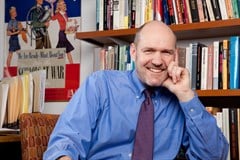At the Ron Paul Institute, our job is to look critically at US foreign policy and point out the disasters of successive interventionist and empire-building administrations. But asked to more clearly define what this Administration is really up to thus far in its second term — what are its goals, what values does it seek to convey worldwide, what are its motivations — we often feel at a profound loss.
What does the president want to see happen in Egypt? Syria? What happens next in Afghanistan, Obama’s “good war”? Russia re-set?
We non-interventionists are not alone in our confusion. Our cousins the realists are also scratching their heads. Even as they tend to support more government action overseas than we, they would like to at least have some idea what the end-goals might be.
One of the realist school’s most consistently cogent personages, Harvard Professor Stephen Walt, joins us in our perplexity. He wonders in his Foreign Policy column today whether the Administration is just plain out of gas:
On Egypt, U.S. policy is neither hard-nosed realist nor a principled defense of democracy. Indeed, I can’t quite figure out what the U.S. policy is except that the Egyptian generals are still going to get the customary U.S. baksheesh and the United States will do its best to nudge them into something it can plausibly defend as kinda, sorta democratic. On Syria, I’m glad the United States hasn’t gone the Full McCain (defined as a blindfolded dive into a shark-infested pool), but it would be nice if someone explained to the world what U.S. policy is. On Iran, the arrival of a new, more moderate president — something the administration was positively panting for back in 2009 — seems to have elicited the most timid of policy responses. Instead of a serious diplomatic initiative, Americans just get to hear more lectures from Prime Minister-Who-Cries-Wolf Netanyahu, who seems to think the United States owes his country another Middle East war. (And while I’m at it, when did CBS News’ Bob Schieffer forget how to ask serious questions? If he plans on retiring anytime soon, a second career hosting paid infomercials beckons).
Maybe I’m being too harsh. The transatlantic trade talks seem to have survived Edward Snowden’s revelations about National Security Agency spying in Europe, though it will be a long slog before a deal is reached. Despite the sequester, the U.S. military (especially the Special Forces) is busy partnering with foreign militaries around the world. (But am I the only person worrying that the most extensive U.S. connection to a lot of countries seems to be through their generals?). The foreign-policy bureaucracy in Washington is still busy churning out talking points for the next set of summit(s), principals’ meetings, or visits from foreign dignitaries. Of course, the vast, top-secret intelligence and counterterrorism empire created after the 9/11 attacks is continuing to burn up $billions, collect gazilla-bytes of data, and Keep Us Safe against a wildly overstated threat.

